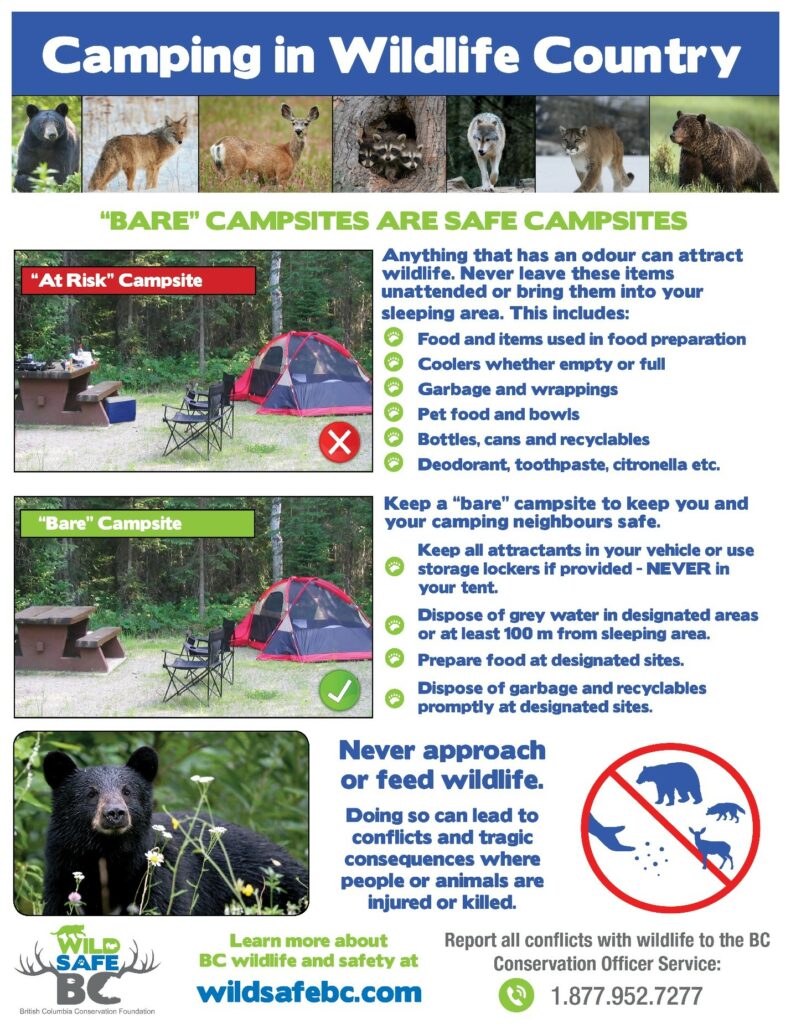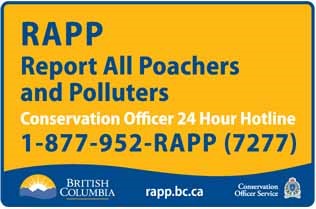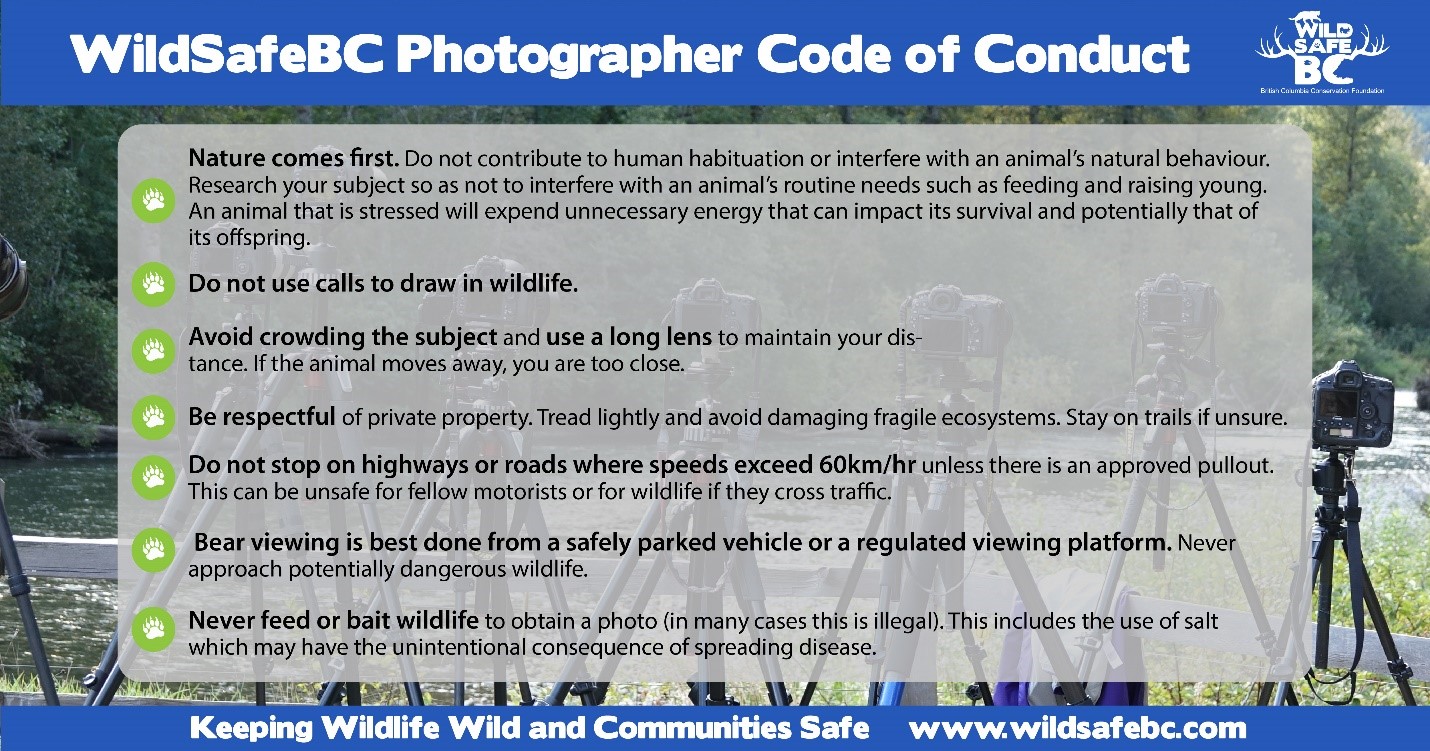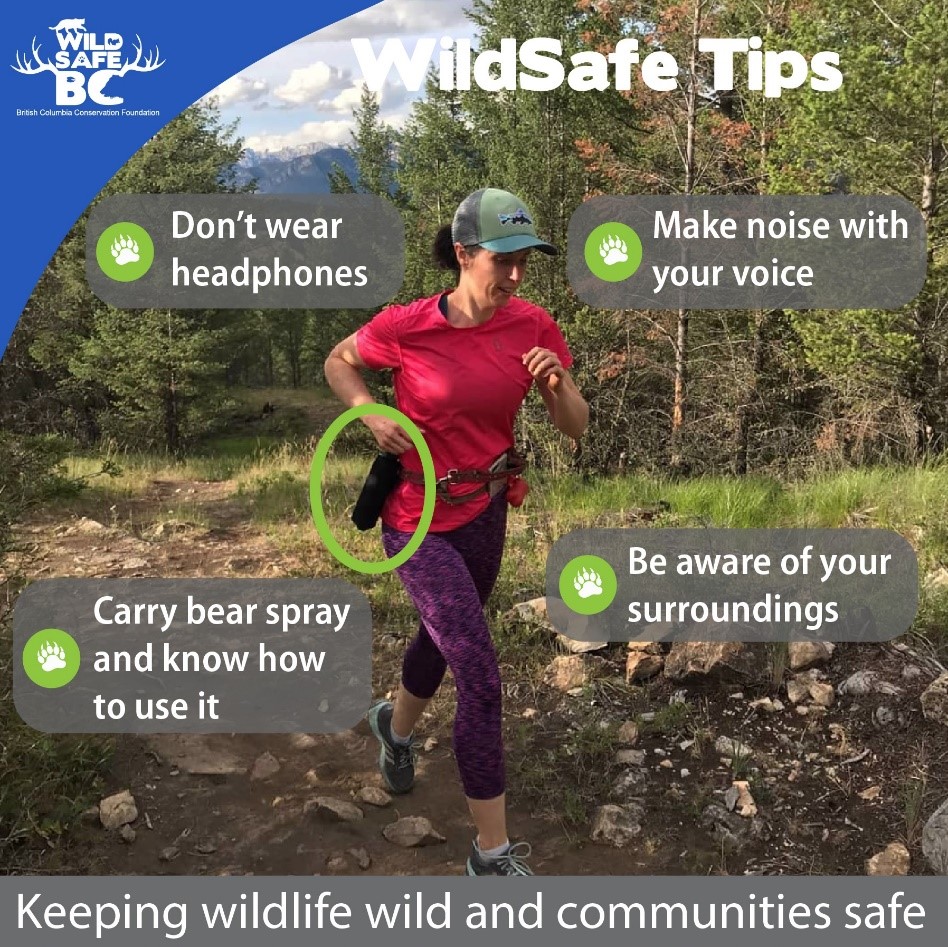Conflict Management Information for Residents and Visitors
New Denver is a great place to visit for nature lovers and outdoor adventurers. Remember to respect the community and the surrounding lakes and forest and the various wildlife that live in our area. Let’s keep the wildlife wild and our community safe. A few relatively simple measures can help prevent or resolve conflicts between you and your wildlife neighbours.
Camping
Because we live and play in proximity to wildlife, bears, crows, or other wildlife will often wander in to our neighborhood and campground. Whether you’re camping or on the trail, we ask that you keep wildlife in mind, by doing the following:
- When camping, keep all food, items related to food (pots, BBQ), and scented products (deodorant, sunscreen) inside your car and not inside of your tent or outside of your trailer.
- When exploring, keep your dog in close proximity or on leash so as to avoid interactions with bears.
- Pack out large amounts of garbage, or dispose of small amounts of garbage in designated bear-proof bins. Do not store your garbage outside of your trailer or vehicle overnight.


Bear Safety on Trails
New Denver has a great network of trails along the lake and creeks. Be aware that bears also use trails to move from one area to another. Bears will likely avoid you if they know you are nearby. Stay alert and look for any signs of bear activity, such as scat, to avoid surprising a bear.
Keep yourself and bears safe by following these tips on trails:
- If bears have been sighted recently, consider an alternative trail.
- Ride, run, hike, or walk in groups of 3 or more whenever possible. Keep your group close together and talk loudly, if you see fresh signs of bears (scat, tracks, claw marks on trees, overturned logs) nearby. Bears should avoid you, if they know you are in the area.
- Carry bear spray in an easily accessible yet protected area and know how to use it.
- Keep all dogs on leash. Dogs can provoke defensive behaviour in bears. Mountain bikers should leave dogs at home.
- Remove your earbuds while walking or running; remain alert and listen for signs of a bear in the area. Creeks and rivers can muffle sounds and make it harder for you to hear an approaching bear. They also make it harder for the bear to hear you, especially while moving quickly, so make extra noise when using trails near running water.
- On trails with limited visibility, use extra caution and make more noise to avoid surprising a bear.
Wildlife Reporting
Conflicts with wildlife and sightings of dangerous wildlife in your neighbourhood should be reported to the Conservation Officer Service either by calling 1-877-952-7277 or completing their online form. These reports are updated daily to WildSafeBC’s Wildlife Alert Reporting Program that is available to anyone with internet access. Reporting an animal does not mean it will automatically be destroyed – the earlier it is reported, the more likely intervention will be able to occur before the animal has become food conditioned or habituated which can encourage the animal to move on. Once an animal learns that it can get a reward repeatedly, and becomes habituated or food conditioned, there is a higher chance that it may need to be destroyed. Prevention of conflicts is key and identifying sources of conflicts.
RAPP Hotline
If public safety is at risk, please call the RAPP hotline:
1-877- 952-RAPP (#7277 on the TELUS Mobility Network).
This hotline should be used to report wildlife-human interactions where public safety may be at risk. The RAPP hotline is available 24/7, and simple, safe and effective.
Learn more about human-wildlife conflict: Government of BC website.

Wildlife Alert Reporting Program (WARP)
The Wildlife Alert Reporting Program (WARP) is a program developed by WildSafe BC to enable the public to view reports regarding wildlife made to the BC Conservation Officer Service 24/7 call centre at 1-877-952-7277. If the situation is not urgent, reports can also be made using WARP. The Wildlife Alert Reporting Program (WARP) is a program developed by WildSafeBC to enable the public to view reports regarding wildlife made to the BC Conservation Officer Service.
WARP reports are updated daily to a publicly available georeferenced map. The public can also sign up for a free account and received alerts that are tailored to their species and location of interest. Learn more by visiting https://warp.wildsafebc.com/.
Wildlife Viewing
Wildlife frequently feed alongside the highway or roadways and will often cross these roadways in pursuit of food sources. Motorists and cyclists should be alert at all times and anticipate wildlife, particularly deer. In fact, 80% of collisions in BC involve deer, and there are ~11,000 vehicle collisions with wildlife every year.
Never stop to view, photograph or feed wildlife. Slowing or stopping to view wildlife on the side of the road creates a hazard for other drivers and habituates wildlife to human presence. If you see wildlife along the road, slow down, stay in your vehicle and move on. Always obey posted speed limits.





